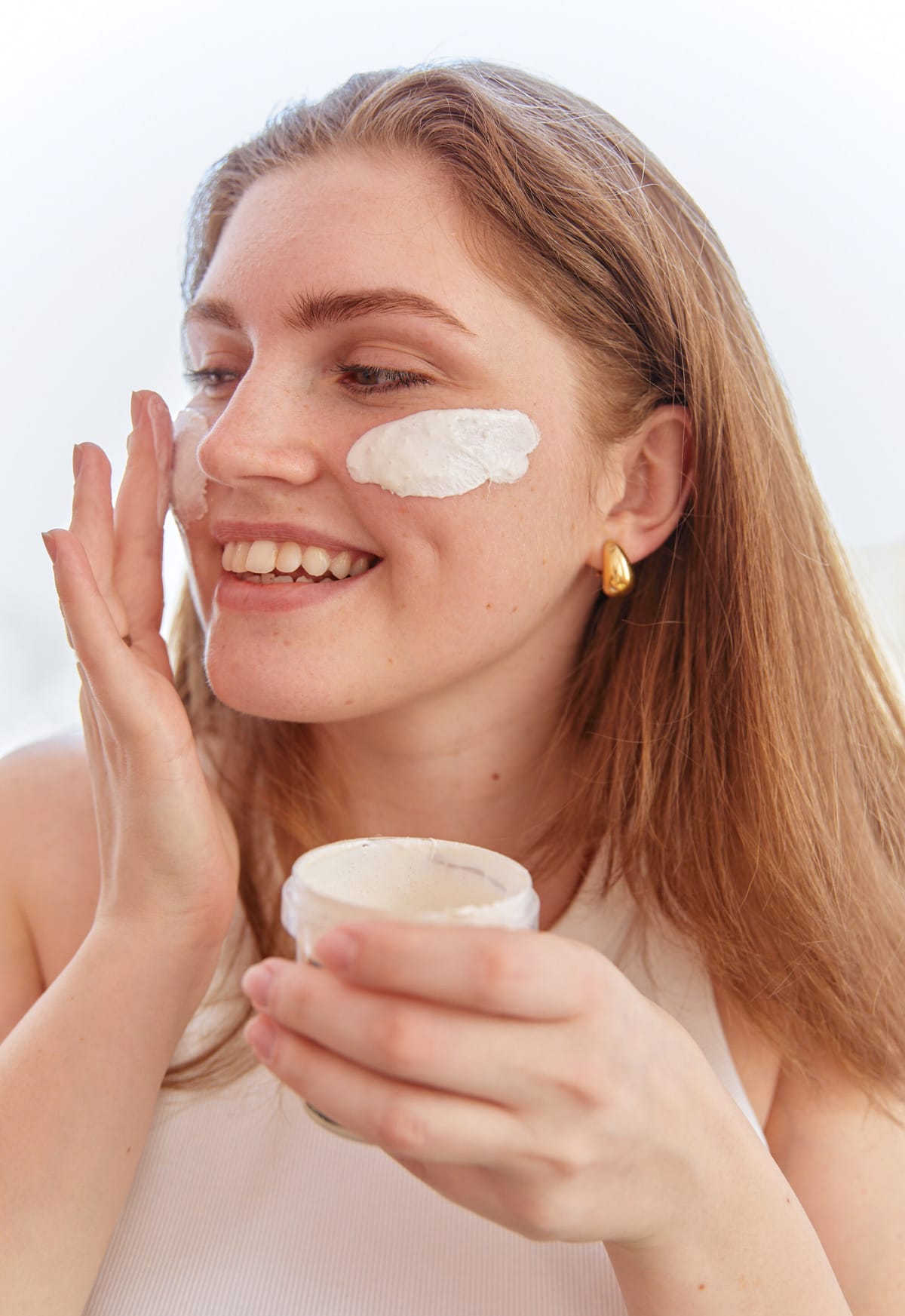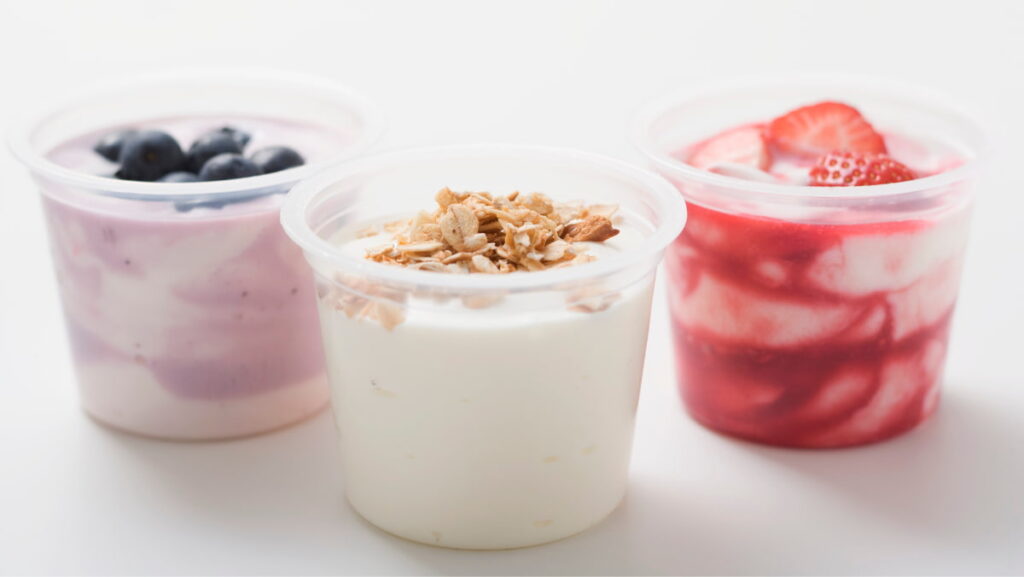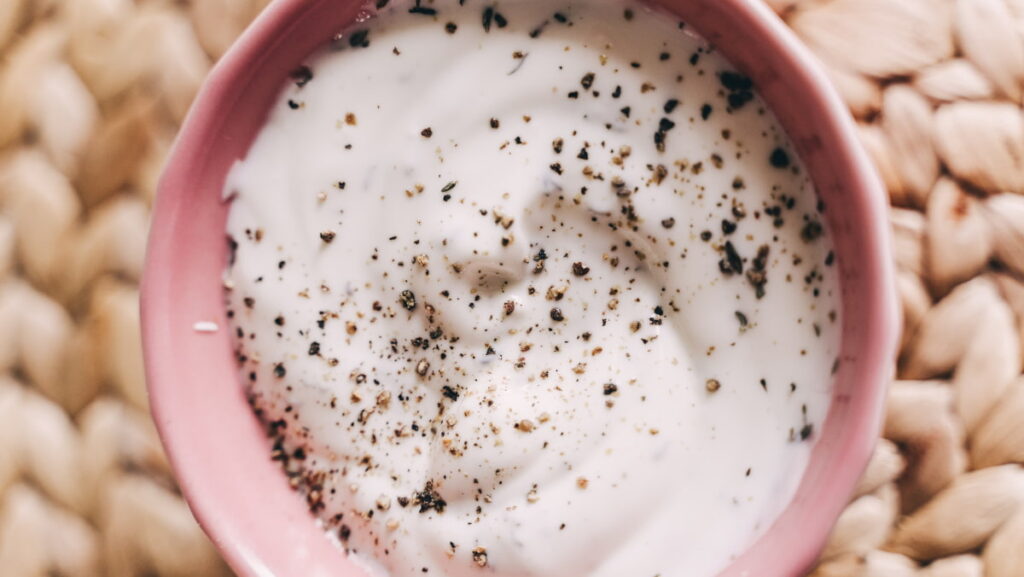
Skincare enthusiasts always look for natural and effective ways to enhance their skin’s health.
Even with a myriad of skincare products out there, yogurt stands out as an easily accessible and versatile option that can work wonders for the skin. Wait what? Yes, you read that right!
It’s not just a delicious snack or breakfast; yogurt has several benefits for the skin because it’s packed with nutrients.
The secret behind yogurt’s effectiveness lies in its rich content of probiotics, vitamins, and minerals that promote a healthy, glowing complexion.
I’ve noticed that yogurt does more than moisturize and nourish my skin; it also helps to combat various skin issues, including acne, premature aging, and sun damage.
So, forget those expensive creams and serums, and grab a container of yogurt from the fridge! I’ll dive into the multiple benefits of yogurt for the skin that’ll make you want to integrate this amazing superfood into your routine ASAP.
8 Mind-Blowing Benefits Of Yogurt For The Skin

1. Yogurt Moisturizes The Skin
If you’re searching for a natural way to keep your skin hydrated, yogurt might be the answer! As a natural moisturizer, research has found that yogurt helps to hydrate and restore its elasticity effectively.
So, what makes yogurt an excellent choice for skin hydration? It’s packed with proteins, fats, and vitamins that are vital for maintaining a healthy complexion.
Moreover, lactic acid, an alpha hydroxy acid (AHA), is present in yogurt[1], which aids in dissolving dead skin cells and revealing a fresher layer of skin underneath. Some key elements in yogurt include:
- Protein: Helps to strengthen the skin’s structure, making it more resistant to damage.
- Fats: Essential for keeping the skin plump and well-nourished.
- Vitamins: Especially vitamin B5, which acts as a natural moisturizer and promotes healthy cell regeneration.
2. Yogurt Repairs The Breached Skin Barrier
Most of the benefits of yogurt for the skin can be attributed to its probiotic content. Probiotics are live bacteria cultures present in fermented products like yogurt.
Before you begin saying that applying bacteria on your face is gross, let me tell you that probiotics work wonders when applied directly to the skin’s surface.
These little microbes hold the key to repairing a breached skin barrier. When yogurt’s probiotics come into contact with your skin, they spring into action by boosting the production of ceramides. These ceramides are like the building blocks of a strong skin barrier.
By increasing their presence, yogurt helps to reduce TEWL (transepidermal water loss), allowing your skin to retain precious moisture more effectively. This not only brings a radiant glow but also accelerates the healing process.
But that’s not all; these probiotics are like your skin’s loyal defenders, with their natural antimicrobial properties fending off potential infections that can be the cause or outcome of a compromised skin barrier.
3. Yogurt Can Heal Acne
One of the main benefits of yogurt for the skin is its ability to reduce acne and blemishes. The reason behind this is the presence of natural probiotics in yogurt that contributes to balancing the skin’s microbiome. This means a reduction in P. acnes, the bacteria responsible for acne, which can help prevent breakouts.
According to the review from 2015 I linked above, probiotics reduce overall inflammation, which may, in turn, soothe acne and help to prevent future breakouts.
More so, incorporating yogurt into face masks and other topical applications has proven its effectiveness in treating acne-prone skin.
For example, a famous DIY mask combines yogurt, honey, and turmeric for antibacterial and anti-inflammatory treatment. To make this mask at home, follow these steps:
- Combine one tablespoon of plain, unsweetened yogurt with a teaspoon of raw honey and a pinch of turmeric.
- Mix well until you achieve a smooth, even consistency.
- Apply the mixture onto clean, dry skin, avoiding the eye area.
- Leave it on for 15-20 minutes, then rinse off with lukewarm water.
| Component | Benefits |
| Plain Yogurt | Lactic acid (AHA) exfoliates and unclogs pores |
| Raw Honey | Antibacterial, moisturizing, and soothing |
| Turmeric | Anti-inflammatory and antioxidant reduces redness |
4. Yogurt Can Reduce The Appearance Of Aging Skin
The same 2015 review suggests that the probiotics in yogurt are also potential factors against the signs of aging. As we age, the skin’s natural pH tends to rise, impacting the skin’s ecosystem and enzymatic activity.
However, topical probiotics can assist in restoring a lower pH, creating a favorable environment for beneficial bacteria to thrive, and supporting essential enzyme functions.
Yogurt’s repertoire continues. Within its composition lie polysaccharides, potent antioxidants. These antioxidants diligently target free radicals triggered by environmental factors like UV radiation.
By doing so, they contribute to mitigating oxidative stress – a driver of aging. You can see wrinkles and lines softly fade just by yogurt’s antioxidative impact.
5. Yogurt Soothes Inflamed Skin
According to research, yogurt probiotics can be an effective ally against inflammatory skin conditions like atopic dermatitis, psoriasis, and rosacea. This can be attributed mainly to the dual properties of antimicrobial and immune-regulatory.
To break this down, here are some ways yogurt can help address inflammation:
- The zinc found in yogurt has anti-inflammatory properties that can help soothe the skin and calm acne breakouts.
- The combination of lactic acid and zinc has been proven to reduce inflammation in the skin effectively.
Below is a table outlining some essential components of yogurt that contribute to its effectiveness in soothing sunburns and inflammation:
| Component | Role in Soothing Skin |
| Lactic Acid | Exfoliates and soothes skin |
| Probiotics | Fights harmful bacteria, promoting overall skin health |
| Zinc | Reduces redness and inflammation |
6. Yogurt Promotes Wound Healing
According to this 2020 review, yogurt probiotics have promising effects on wound healing. They do so in three ways. Firstly, yogurt probiotics act as guards against infection, which could compromise the healing process.
Secondly, by bolstering the immune system, yogurt ensures a balanced response that aids recovery. And thirdly, yogurt’s composition contains elements that may accelerate the healing process.
With its multifaceted approach, yogurt emerges as a natural contender for those seeking practical wound-healing support.
7. Yogurt Has Skin Brightening Effects
One 2011 study has suggested that yogurt has the potential to fight against hyperpigmentation. Now why is that?
We can mainly attribute it to yogurt’s content of lactic acid, a mild exfoliator. Through the gentle removal of dull surface cells, yogurt assists in revealing a brighter, more even skin tone.
8. Yogurt Can Sooth Sunburns
I can’t stress enough how beneficial yogurt is, especially when it comes to soothing sunburns and inflammation. Its cooling effect plays a significant role in helping to alleviate skin irritations.
One of the critical components in yogurt is lactic acid, an alpha hydroxy acid that can help soothe the skin. That’s why it can also provide gentle relief for sunburned skin.
To help calm down sunburns, you can create a simple yogurt mask by applying a few tablespoons of plain yogurt all over the affected area. Leave it on for about 10-15 minutes, then rinse with cool water. This can be repeated as needed to help alleviate any discomfort.
I promise this tip works! I once had the worst sunburn all over my legs, which was so painful I didn’t know what to do. I poured yogurt over them, and it gave me instant relief!
Another tip for sunburn relief is to opt for yogurt varieties with high-fat content, such as full-fat or Greek yogurt. Fat helps moisturize and nourish the skin, which can benefit dry, sunburned skin.
Potential Side Effects Of Yogurt On The Skin
While yogurt is generally safe for most people, there are a few potential side effects or considerations to keep in mind when using it on the skin:
- Allergic reactions: Some individuals may be allergic to dairy products or specific components of yogurt. If you have known allergies to dairy or have experienced allergic reactions to yogurt in the past, it’s best to avoid using it on your skin.
- Irritation or sensitivity: Although rare, yogurt may cause skin irritation or sensitivity in some individuals. This can manifest as redness, itching, or a rash.
- Aggravation of existing conditions: If you have certain skin conditions like eczema or rosacea, yogurt may not be suitable for your skin. The acidity of yogurt and its active components can sometimes worsen symptoms.
Pro tip: If you have sensitive skin, start with small amounts of yogurt and monitor your skin’s reaction. If you experience any adverse reactions or discomfort after using yogurt on your skin, discontinue its use.

How To Use Yogurt On The Skin
The benefits of yogurt for the skin are undeniably great, but all yogurt types are suitable for skin application.
When using yogurt as a topical treatment, choosing a plain, unsweetened variety is essential to avoid irritation from added sugars and flavors.
For maximum effectiveness, go for full-fat Greek yogurt that contains all the nutrients to the fullest. Stick to high-quality, natural products as they offer more benefits for the skin.
Now that you know which yogurts are best for the skin, it’s time to explore how to apply it. Yogurt can be used in various ways to benefit the skin. Here are a few ways you can experiment with:
- Moisturizing face mask: Apply plain yogurt directly to your face as a mask. Leave it on for about 15-20 minutes, then rinse off with lukewarm water. This can help hydrate and soften the skin. Otherwise, you can mix yogurt with another skin-loving ingredient, like honey or olive oil.
- Exfoliating scrub: Mix yogurt with a natural exfoliant like ground oatmeal or sugar to create a gentle scrub. Gently massage the mixture onto damp skin in circular motions, then rinse off. This helps remove dead skin cells and promotes a smoother complexion.
- Soothing sunburn relief: Apply chilled yogurt to sunburned areas of the skin for soothing relief. The coolness of the yogurt can help alleviate pain and reduce redness.
- Spot treatment for acne: Dab a small amount of yogurt directly onto blemishes, acne-prone areas, or dry skin patches. Leave it on for about 10-15 minutes, then rinse off. The antibacterial properties of yogurt may help reduce inflammation and redness.
- Lightening dark spots: Mix yogurt with a few drops of lemon juice or a pinch of turmeric powder. Apply the mixture to areas with dark spots or hyperpigmentation. Leave it on for 15-20 minutes, then rinse off. Both lemon juice and turmeric have natural skin-lightening properties, which can help fade dark spots over time.
Pro tip: Remember to patch-test any new ingredient, including yogurt, on a small area of your skin to check for any adverse reactions.
Best Products Containing Yogurt
KORRES is a brand that has a Yogurt line that is really, really good. If you want to incorporate yogurt into your routine, please check out the following KORRES products:
- Greek Yoghurt Nourishing Probiotic Gel-Cream
- Greek Yoghurt Wide Awake Eye Gel
- Greek Yoghurt Probiotic Quench Sleeping Facial
- Greek Yoghurt Foaming Cream Cleanser
- Greek Yoghurt Probiotic SuperDose Face Mask
- Greek Yoghurt Cooling After-Sun Gel Face & Body
Alternatives To Using Yogurt On The Skin
What happens if you don’t have yogurt around? Can you still harness similar advantages from other ingredients as the benefits of yogurt for the skin?
Sure you can – there are plenty of alternatives that offer similar benefits! Here are just a few examples to try:
- Honey: This ingredient has moisturizing and anti-inflammatory properties;
- Oatmeal: Can help soothe redness and irritation on the skin;
- Aloe Vera Gel: Known for its calming effects, it is great for soothing sunburns;
- Avocado Oil: Provides nourishment and hydration;
- Aloe Juice: Can help reduce acne breakouts.
Conclusion On Benefits Of Yogurt For The Skin
Yogurt has proven to be a versatile and natural skincare ingredient with the power to nourish and revitalize your complexion. The benefits of yogurt for the skin are impressive and easily available.
Yogurt is an affordable, natural alternative to many store-bought products that may contain synthetic or harmful ingredients.
However, it’s important to remember that yogurt should be just one component of a comprehensive skincare regimen. To maintain the overall health and appearance of your skin, don’t forget to maintain a healthy skincare routine and lifestyle:
- Keep your skin clean and avoid touching your face with unclean hands.
- Stay hydrated and consume a balanced diet rich in vitamins and antioxidants.
- Protect your skin from the sun by applying sunscreen and wearing protective clothing.
- Manage stress to avoid cortisol-induced inflammation and premature aging.
Utilizing yogurt as part of a balanced skincare routine can provide impressive results. With consistent use, you’ll likely see improvements in your skin’s overall texture and appearance.
So go ahead and give yogurt a try – the benefits of yogurt for the skin will have you stunned!
